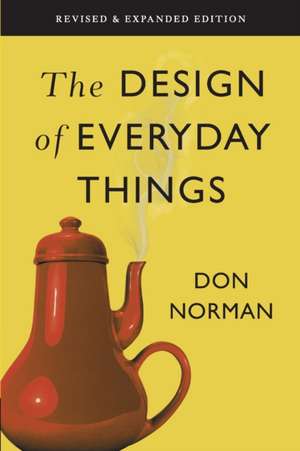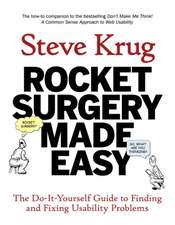The Design of Everyday Things: Revised and Expanded Edition
Autor Don Normanen Limba Engleză Paperback – 4 noi 2013
Even the smartest among us can feel inept as we fail to figure out which light switch or oven burner to turn on, or whether to push, pull, or slide a door. The fault, argues this ingenious—even liberating—book, lies not in ourselves, but in product design that ignores the needs of users and the principles of cognitive psychology. The problems range from ambiguous and hidden controls to arbitrary relationships between controls and functions, coupled with a lack of feedback or other assistance and unreasonable demands on memorization. The Design of Everyday Things shows that good, usable design is possible. The rules are simple: make things visible, exploit natural relationships that couple function and control, and make intelligent use of constraints. The goal: guide the user effortlessly to the right action on the right control at the right time.
In this entertaining and insightful analysis, cognitive scientist Don Norman hails excellence of design as the most important key to regaining the competitive edge in influencing consumer behavior. Now fully expanded and updated, with a new introduction by the author, The Design of Everyday Things is a powerful primer on how—and why—some products satisfy customers while others only frustrate them.
In this entertaining and insightful analysis, cognitive scientist Don Norman hails excellence of design as the most important key to regaining the competitive edge in influencing consumer behavior. Now fully expanded and updated, with a new introduction by the author, The Design of Everyday Things is a powerful primer on how—and why—some products satisfy customers while others only frustrate them.
| Toate formatele și edițiile | Preț | Express |
|---|---|---|
| Paperback (2) | 108.41 lei 3-5 săpt. | +29.80 lei 10-14 zile |
| BASIC BOOKS – 4 noi 2013 | 108.41 lei 3-5 săpt. | +29.80 lei 10-14 zile |
| Mit Press – 22 dec 2013 | 129.05 lei 3-5 săpt. | +22.21 lei 10-14 zile |
Preț: 108.41 lei
Nou
Puncte Express: 163
Preț estimativ în valută:
20.75€ • 21.53$ • 17.34£
20.75€ • 21.53$ • 17.34£
Carte disponibilă
Livrare economică 22 februarie-08 martie
Livrare express 11-15 februarie pentru 39.79 lei
Preluare comenzi: 021 569.72.76
Specificații
ISBN-13: 9780465050659
ISBN-10: 0465050654
Pagini: 368
Dimensiuni: 140 x 211 x 25 mm
Greutate: 0.3 kg
Ediția:Revizuită
Editura: BASIC BOOKS
Colecția Basic Books
ISBN-10: 0465050654
Pagini: 368
Dimensiuni: 140 x 211 x 25 mm
Greutate: 0.3 kg
Ediția:Revizuită
Editura: BASIC BOOKS
Colecția Basic Books
Notă biografică
Don Norman is a co-founder of the Nielsen Norman Group, and holds graduate degrees in both engineering and psychology. His many books include Emotional Design, The Design of Future Things, and Living with Complexity. He lives in Silicon Valley, California.
Recenzii
"Design
may
be
our
top
competitive
edge.
This
book
is
a
joy--fun
and
of
the
utmost
importance."—Tom
Peters,
author
ofIn
Search
of
Excellence
"Design may be our top competitive edge. This book is a joy--fun and of the utmost importance."—Tom Peters, author ofIn Search of Excellence
"This
book
changed
the
field
of
design.
As
the
pace
of
technological
change
accelerates,
the
principles
in
this
book
are
increasingly
important.
The
new
examples
and
ideas
about
design
and
product
development
make
it
essential
reading."
—Patrick
Whitney,
Dean,
Institute
of
Design,
and
Steelcase/Robert
C.
Pew
Professor
of
Design,
Illinois
Institute
of
Technology"Design may be our top competitive edge. This book is a joy--fun and of the utmost importance."—Tom Peters, author ofIn Search of Excellence
Descriere
Even the smartest among us can feel inept as we fail to figure out which light switch or oven burner to turn on, or whether to push, pull, or slide a door. The fault, argues this ingenious—even liberating—book, lies not in ourselves, but in product design that ignores the needs of users and the principles of cognitive psychology. The problems range from ambiguous and hidden controls to arbitrary relationships between controls and functions, coupled with a lack of feedback or other assistance and unreasonable demands on memorization. The Design of Everyday Things shows that good, usable design is possible. The rules are simple: make things visible, exploit natural relationships that couple function and control, and make intelligent use of constraints. The goal: guide the user effortlessly to the right action on the right control at the right time.
In this entertaining and insightful analysis, cognitive scientist Don Norman hails excellence of design as the most important key to regaining the competitive edge in influencing consumer behavior. Now fully expanded and updated, with a new introduction by the author, The Design of Everyday Things is a powerful primer on how—and why—some products satisfy customers while others only frustrate them.
In this entertaining and insightful analysis, cognitive scientist Don Norman hails excellence of design as the most important key to regaining the competitive edge in influencing consumer behavior. Now fully expanded and updated, with a new introduction by the author, The Design of Everyday Things is a powerful primer on how—and why—some products satisfy customers while others only frustrate them.
















